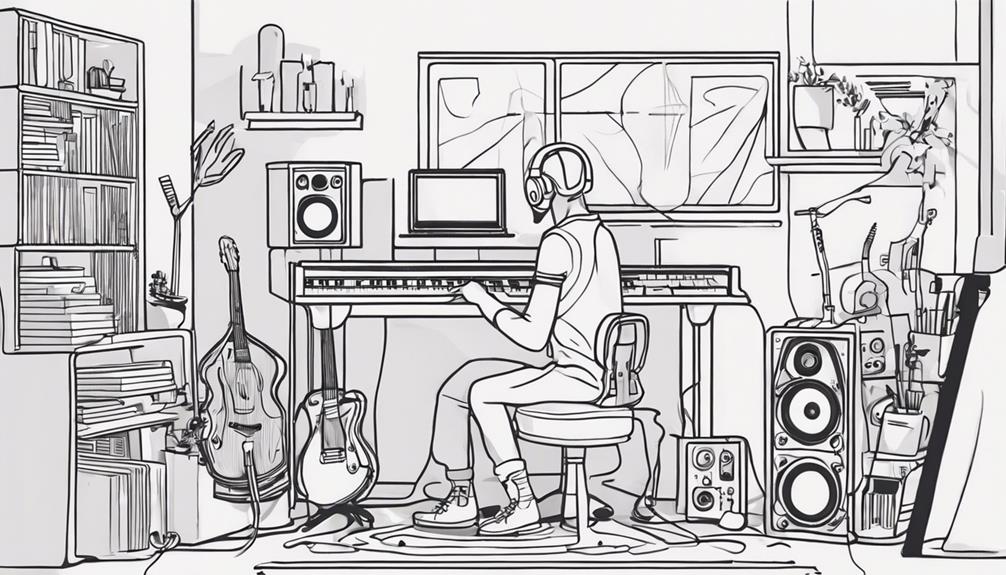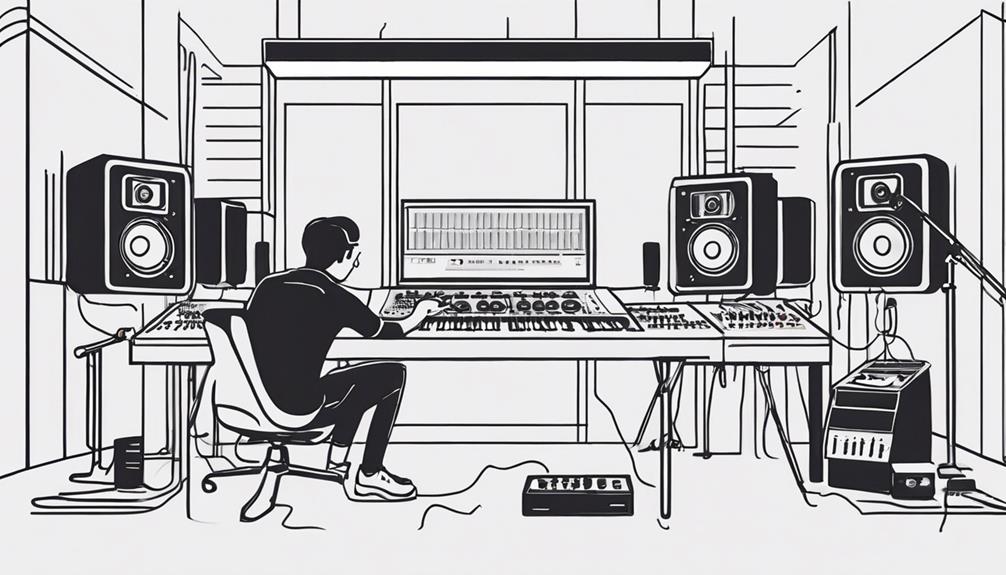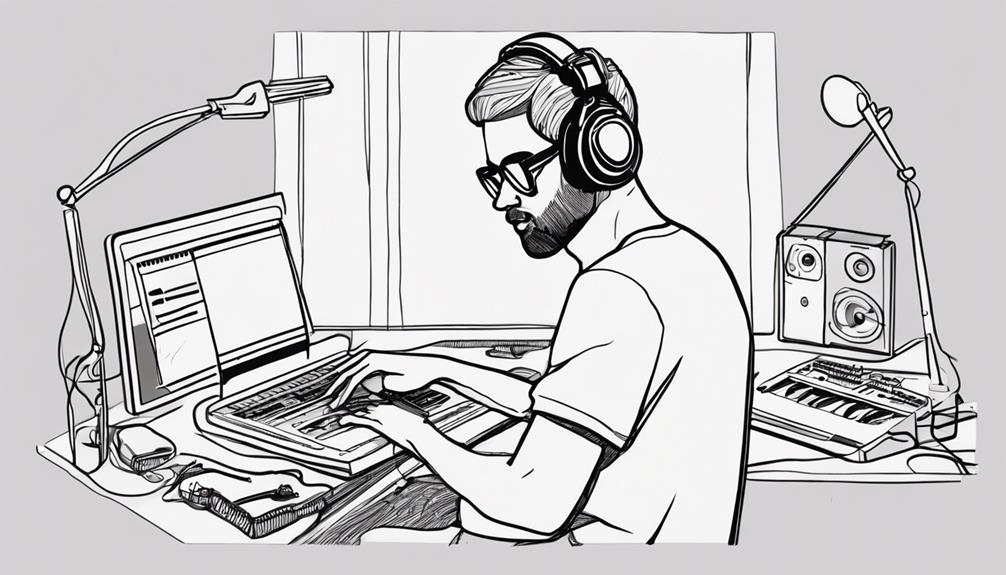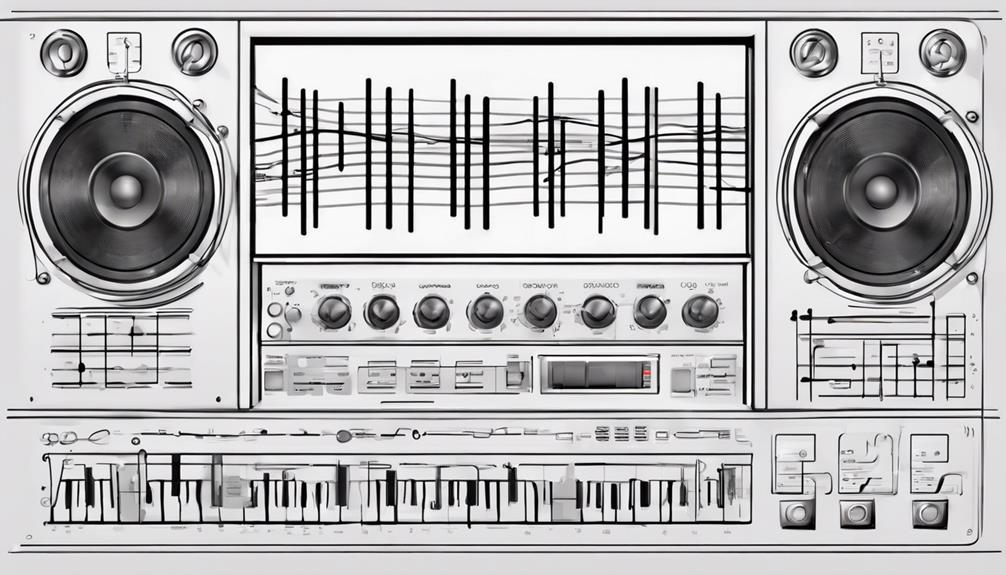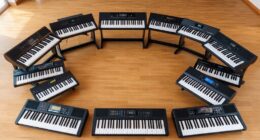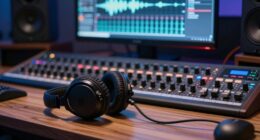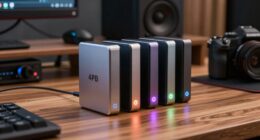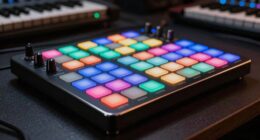Rediscover what sparked your love for music production. Reflect on the magic of creating music and listen to tracks that inspired you. Create a dedicated, inspiring workspace with good lighting and a clutter-free layout. Stay updated on techniques, explore different genres, and collaborate with fellow musicians. Take breaks, stay hydrated, and prioritize self-care to avoid burnout. Engage in non-music activities to recharge creatively and find joy in the process. Celebrate small victories to keep your motivation high. Explore ways to keep your passion alive and thriving.
Key Takeaways
- Rediscover your initial inspiration and passion for music production.
- Create a creative environment with inspiring decor and optimal lighting.
- Stay updated on music production techniques and collaborate with others.
- Practice self-care, avoid burnout, and prioritize mental health.
- Engage in non-music activities for creative recharge and seek new sources of inspiration.
Rediscovering Your Initial Inspiration
Reflect on what initially sparked your interest in music production to reignite your passion and creativity. Think back to the first time you were mesmerized by the magic of creating music. Was it a powerful beat, a soulful melody, or perhaps the sheer emotion conveyed through a song?
Reconnecting with that initial inspiration can reignite the fire within you.
Listen to your favorite tracks that initially inspired you to start producing music. Let the melodies wash over you, the rhythms stir your soul, and the lyrics speak to your heart. These songs hold the key to igniting your creativity and reviving your passion for music production.
As you reflect on your favorite tracks and albums, consider the growth you've experienced since you first set out on this musical journey. Appreciate the progress you've made, the skills you've honed, and the artistry you've developed.
Reminding yourself of your growth can fuel your passion and motivate you to continue pushing the boundaries of your creativity.
Cultivating a Creative Environment
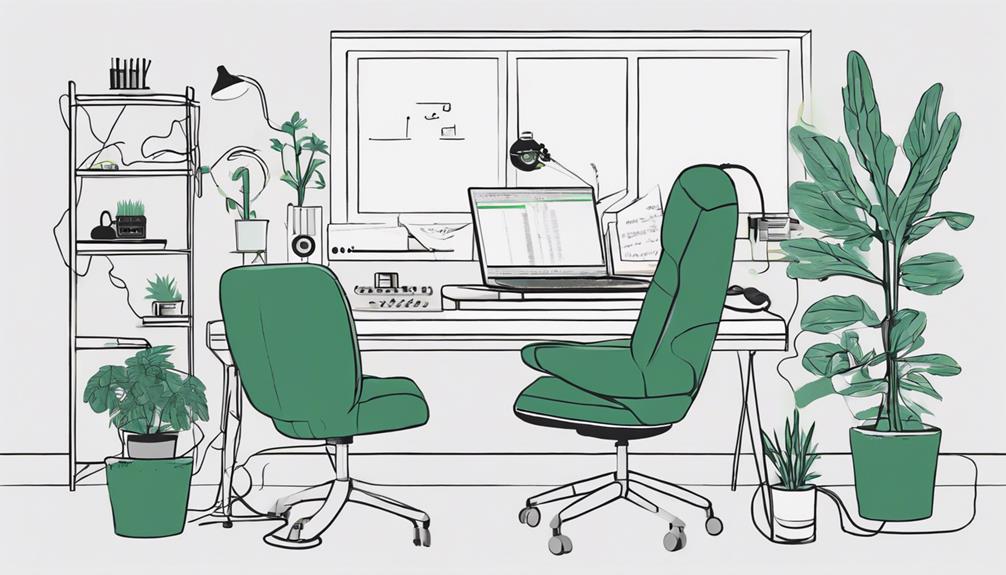
Set the stage for your music production journey by crafting an inspiring workspace that fuels your creativity.
Choose lighting that enhances your mood and invest in a personalized sound system that elevates your production experience.
These elements won't only boost your productivity but also make your creative environment a place where magic happens.
Inspiring Workspace Setup
Enhance your music production creativity by cultivating an inspiring workspace setup. Create a dedicated area with inspiring decor, such as artwork or motivational quotes, to boost your mood and spark creativity.
Efficiently organize your studio layout to have easy access to instruments, software, and gear for a seamless workflow. Personal touches like plants or comfortable seating can contribute to a vital atmosphere that encourages productivity.
Ensure your workspace is well-lit, either with natural light or adjustable LED lights, to set the right mood for your music production sessions. A well-lit environment can enhance your focus and overall enjoyment of the creative process.
Additionally, keeping your workspace clutter-free and organized is essential in minimizing distractions and maintaining your concentration on your music projects.
Mood-Enhancing Lighting Choices
Experimenting with various lighting options is key to cultivating a creative environment in your music production space. To enhance your music production experience, consider using LED strip lights with customizable colors. These lights can help create a dynamic and inspiring atmosphere that aligns with your creative flow.
Smart bulbs that sync with your music are another excellent choice, as they can elevate the mood and boost creativity during your production sessions.
When setting up your lighting, opt for warm, soft lights to establish a cozy and inviting environment that nurtures your creative process. Additionally, incorporating color-changing light panels can be a great way to set different moods and stimulate your creativity while working on music projects.
Having dimmable lights is also beneficial, allowing you to adjust the lighting to match your mood and productivity levels seamlessly.
Personalized Sound System
Invest in high-quality studio monitors or headphones to guarantee you catch every intricate detail in your music production process. As music producers, having a personalized sound system is important for creating excellent tracks.
When setting up your studio, consider optimizing sound system placement for balanced acoustics. Proper speaker positioning can make a significant difference in the quality of sound you hear.
Additionally, customize your sound system settings to align with your music production preferences and workflow. Adjusting settings like equalization, volume levels, and audio interfaces can enhance your overall experience and productivity.
Embracing Constant Learning and Growth
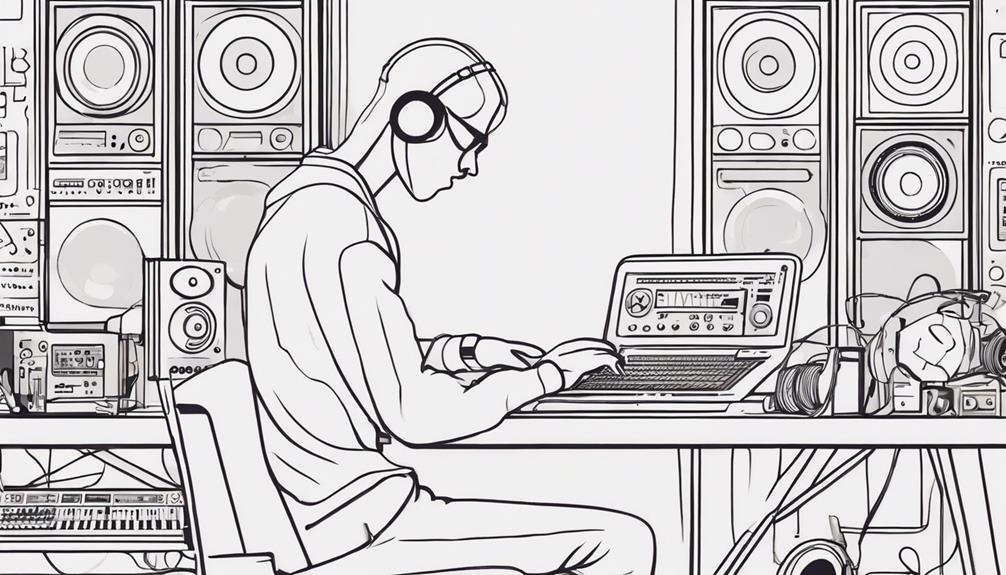
Engaging in continuous learning and growth is essential for mastering the art of music production. To keep your passion alive and stay at the top of your game, consider the following:
- Learning: Stay updated on new music production techniques and software updates to keep your skills innovative.
- Exploring: Challenge your creativity by exploring different genres and styles, expanding your musical horizons.
- Collaborating: Work with other producers, musicians, and artists to gain new perspectives and find inspiration for your projects.
- Feedback: Seek input from mentors, peers, and listeners to help you grow and improve in your music production journey.
Nurturing Supportive Relationships
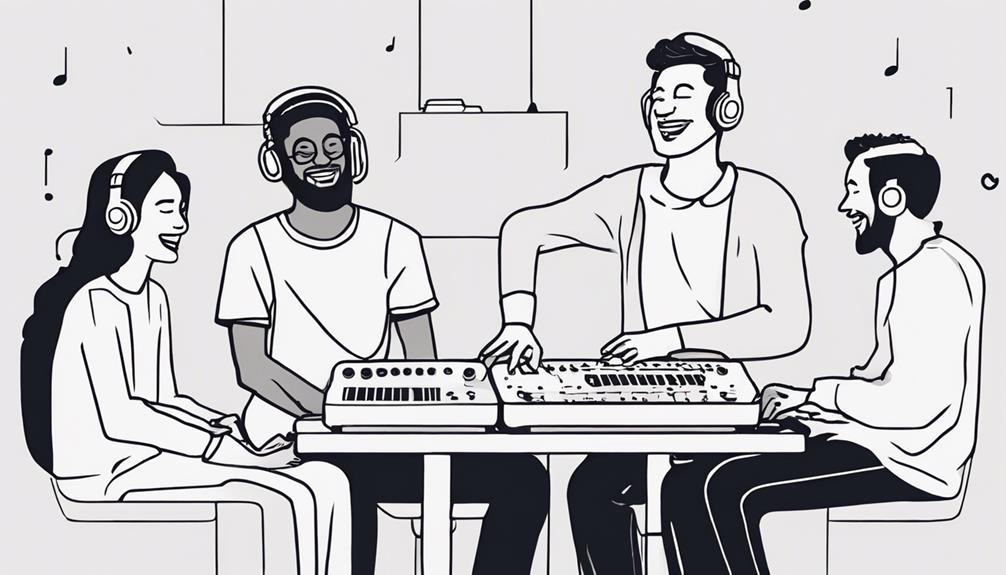
Surround yourself with a supportive network of friends, family, and mentors who share your passion for music production. Collaborate with fellow producers, artists, and musicians to exchange ideas and inspiration.
Engage in online communities and attend workshops to foster a sense of camaraderie and creativity in your music production journey.
Positive Collaborations
Regularly collaborating with other musicians can greatly enhance your music production experience by bringing fresh perspectives and new ideas to the creative process. When you engage in positive collaborations, you not only benefit from the collective creativity but also foster a supportive community within the music production domain.
Here's how nurturing such relationships can keep your passion alive:
- Support and Encouragement: Musicians who collaborate with you can offer valuable support, motivation, and encouragement, helping you stay inspired and committed to your craft.
- Feedback Loop: Collaborators provide constructive feedback that can push your work to new heights, challenging you to explore different techniques and styles.
- Innovative Creations: Working with others opens doors to innovative musical creations that may surprise you, as diverse perspectives merge to create something unique.
- Sense of Belonging: Positive collaborations create a sense of community and camaraderie, making the music production journey more enjoyable and fulfilling.
Encouraging Creative Community
Fostering a supportive network of relationships in the music production community can greatly enhance your creative journey and overall experience. Collaborating with fellow musicians creates a vibrant creative community that offers invaluable feedback, inspiration, and a sense of camaraderie.
Attending music production workshops, meetups, and online forums connects you with like-minded individuals who share your passion for music production. Sharing your work-in-progress with trusted friends or mentors can provide valuable insights and much-needed encouragement to keep pushing forward.
Joining a music production collective or group can offer a supportive environment where you can learn, grow, and share experiences with others who understand the challenges and joys of music production. Building relationships with other producers not only opens doors to collaboration opportunities but also helps you expand your network, gain new perspectives, and feel a sense of belonging within the music production community.
Practicing Self-Care and Avoiding Burnout

To prevent burnout and maintain your well-being in music production, prioritize self-care through various strategies such as taking breaks and setting boundaries.
Here are some tips to help you practice self-care and avoid burnout:
- Take Regular Breaks: Schedule short breaks during your music production sessions to rest your mind and prevent mental fatigue.
- Stay Hydrated and Rested: Make sure you drink enough water and get sufficient sleep to support your overall health and creativity.
- Engage in Non-Music Activities: Explore hobbies or spend time with loved ones to recharge your creative energy and maintain a healthy work-life balance.
- Practice Stress-Relief Techniques: Incorporate mindfulness, deep breathing, or meditation into your routine to manage stress and prevent overwhelm during the music production process.
Seeking New Sources of Inspiration

Explore various avenues to discover new sources of inspiration in your music production journey. Finding inspiration can be as simple as delving into different music genres to spark creativity with fresh sounds.
Attending live performances, music festivals, or industry events immerses you in the vibrant energy of music production, fueling your passion.
Collaborating with fellow musicians, producers, or artists offers a platform to exchange ideas, inspiring innovative approaches in your music creation process.
Drawing inspiration from nature, art, literature, or personal encounters adds unique flavors to your music production, making your work stand out.
Experimenting with new techniques, software, or instruments challenges you to push boundaries and evolve creatively, keeping your love for music production alive.
Experimenting With Different Techniques
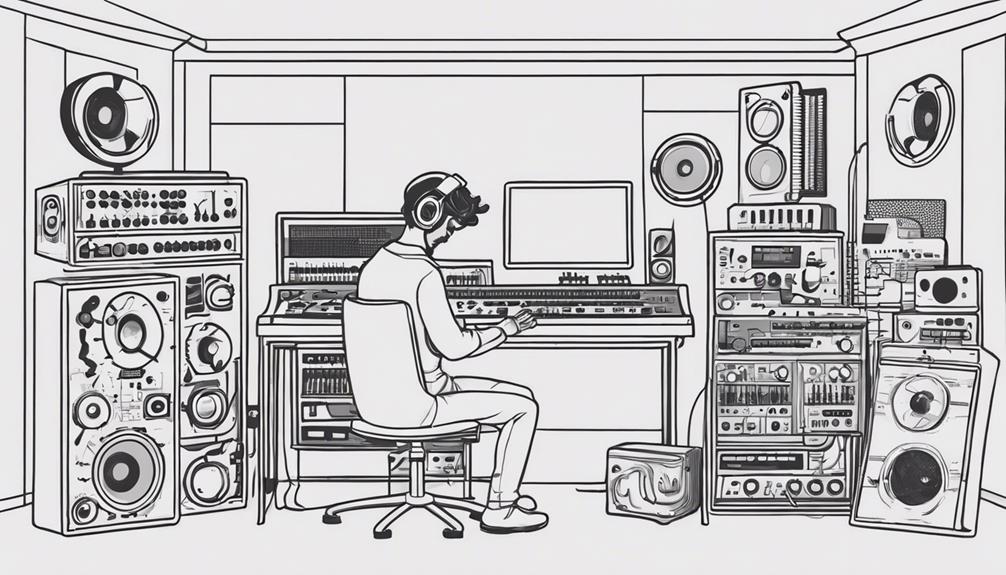
Wondering how you can elevate your music production game? To keep your passion alive, try immersing yourself in different techniques to enhance your music production skills.
Here are some tips to help you level up:
- Incorporate New Effects and Plugins: Explore the vast array of effects and plugins available in your music production software to create unique and innovative sounds that will set your tracks apart.
- Experiment with Mixing Techniques: Engage in different mixing techniques such as parallel compression or stereo widening to add depth and clarity to your music, ultimately enhancing the overall quality of your productions.
- Explore Various Genres and Styles: Step out of your comfort zone and try producing music in different genres and styles. This exploration can broaden your creative horizons and help you discover what truly resonates with you.
- Use Unconventional Instruments: Challenge yourself to integrate unconventional instruments or samples into your productions. This can bring a fresh and distinctive element to your music, setting you apart from the crowd.
Finding Joy in the Process
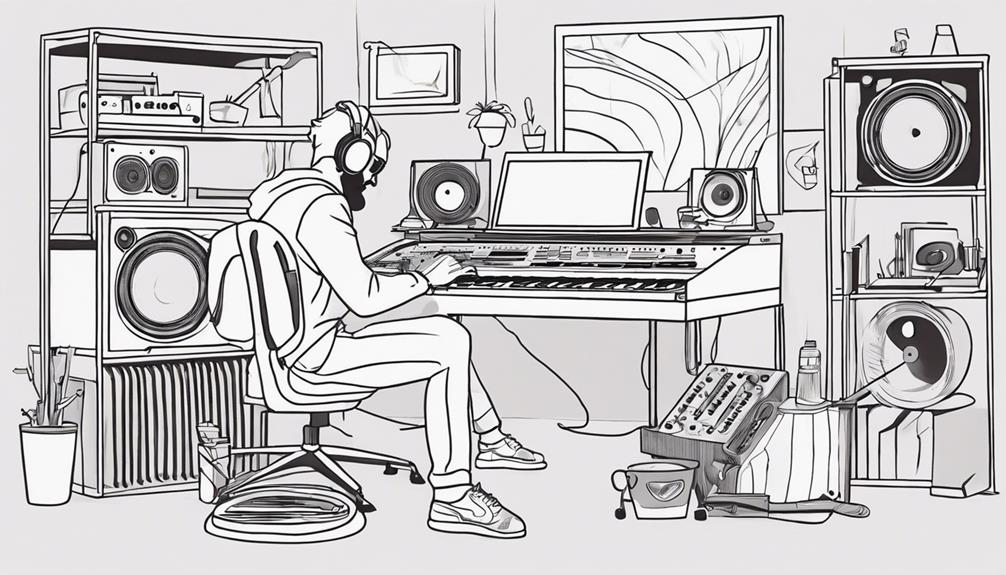
Embracing the creative process of music production can lead to finding joy in experimenting with sounds, melodies, and rhythms. It's vital to cultivate your passion for music by immersing yourself in the process rather than fixating solely on the end result. Remember to take breaks to prevent burnout and gain a fresh perspective on your work. Collaborating with fellow musicians or producers not only fosters a sense of community but also provides opportunities for learning and inspiration. Celebrating small victories along your music production journey is important; it helps you stay motivated and appreciate the progress you've made. Here's a table to highlight the importance of finding joy in the process:
| Benefits of Finding Joy in the Process |
|---|
| Keeps your passion alive |
| Fosters creativity through experimenting |
| Builds a supportive community of like-minded individuals |
Reflecting on Your Musical Journey
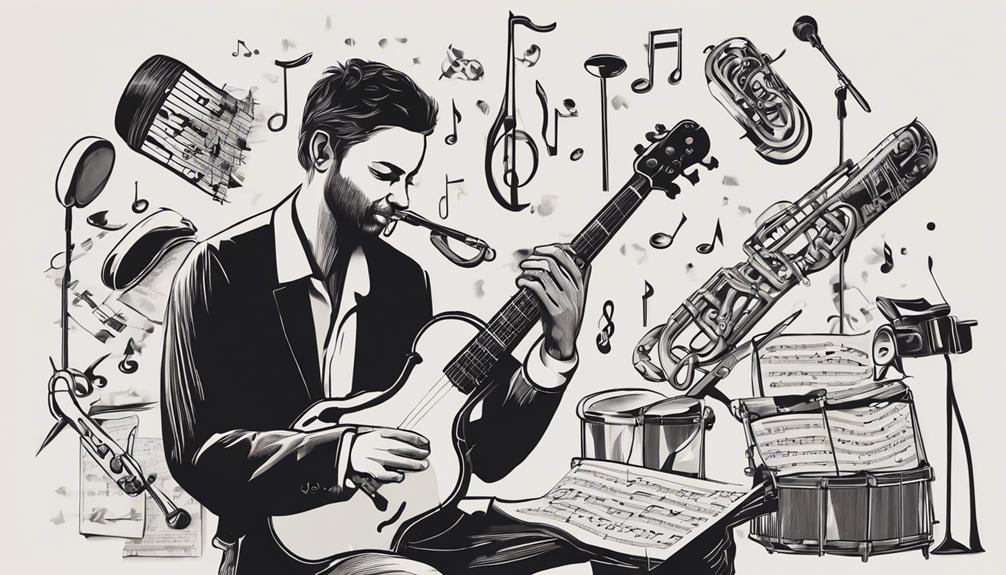
Take a moment to look back on your musical journey and appreciate how far you've come in developing your skills and knowledge in music production.
Reflect on the growth and evolution of your musical skills and knowledge over time. Ponder the milestones and achievements you have reached in your music production journey. Evaluate the challenges you have overcome and how they've shaped your passion for music production.
- Reflect on Growth: Think about how your skills have improved since you started your music production journey. What new techniques have you learned? How has your understanding of music production deepened?
- Celebrate Milestones: Take pride in the milestones you have achieved, whether it's completing your first track, mastering a new software, or collaborating with other musicians.
- Overcoming Challenges: Recall the challenges you faced along the way. How did you tackle them, and what did you learn from those experiences?
- Personal and Professional Impact: Consider how music production has influenced your personal growth and possibly even your professional path. Have you discovered new aspects of yourself through music production?
Frequently Asked Questions
How Do I Stop Losing My Passion for Music?
Reconnect with your initial spark for music. Push through challenges with support. Set goals for growth. Learn from pros and embrace mistakes. Face fears and doubts head-on. Address factors hindering your passion. Keep the fire alive!
Why Did I Lose My Passion for Music?
You lost your passion for music due to comparison, criticism, slow progress, fear of failure, overwhelm, self-doubt, and lack of support. Remember, find your unique journey, embrace mistakes, seek encouragement, and nurture your love for music to reignite your passion.
How to Make Music Production Fun Again?
To make music production fun again, try exploring new genres and techniques. Collaborate with others for fresh ideas. Take breaks when overwhelmed. Attend workshops for new skills. Set goals and celebrate victories to stay engaged and excited. Experimenting with different instruments or digital tools can also spark creativity and help you discover unique sounds. Revisiting old projects with a fresh perspective might reignite your passion and lead to unexpected breakthroughs. By incorporating these strategies, you’ll find it easier to get back into music production with renewed energy and inspiration.
How Do You Survive in the Music Industry?
To survive in the music industry, you must navigate the ever-changing landscape with resilience and adaptability. Network, learn the business side, build your brand, engage on social media, and keep evolving through education. Stay strong!
Conclusion
Keep your passion alive by:
- Rediscovering your initial inspiration
- Cultivating a creative environment
- Embracing constant learning and growth
- Nurturing supportive relationships
- Practicing self-care
- Seeking new sources of inspiration
- Experimenting with different techniques
- Finding joy in the process
Reflect on your musical journey and remember why you started in the first place. Enjoy the journey and keep creating music that brings you fulfillment and happiness.
Stay passionate and keep the music alive!

